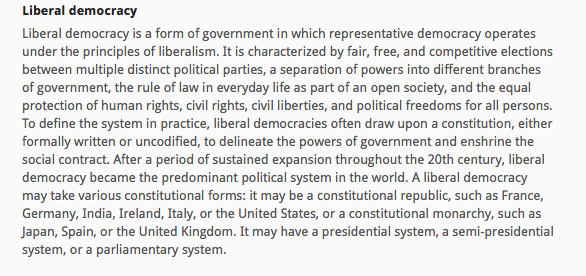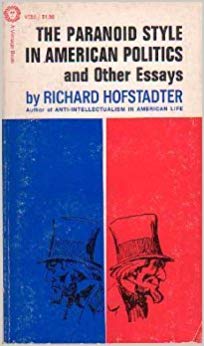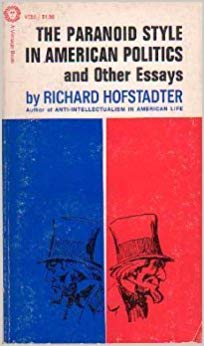2/ The authors (and Karen in other work) describe people who have authoritarian dispositions, and distinguish such people from traditional or "status quo" conservatives.
Those with authoritarian dispositions are averse to complexity (which includes diversity).
Those with authoritarian dispositions are averse to complexity (which includes diversity).
3/ They prefer sameness and uniformity. They can be good citizens because (when they aren& #39;t riled) they respect institutions and authority.
However, when faced with a normative threat, they can become dangerous. (I& #39;m paraphrasing and simplifying the article.)
However, when faced with a normative threat, they can become dangerous. (I& #39;m paraphrasing and simplifying the article.)
4/ A normative threat is something that threatens “sameness and order.” It& #39;s a perceived threat.
Trump creates normative threats when he talks about "invaders" at the border, "illegal" immigrants bringing crime, etc.
This riles those with authoritarian dispositions.
Trump creates normative threats when he talks about "invaders" at the border, "illegal" immigrants bringing crime, etc.
This riles those with authoritarian dispositions.
5/ When confronted with a normative threat, authoritarians have a strong reaction.
They become fearful and angry. They can be violent & tolerate violence in others.
Trump governs by creating normative threats. He deliberately keeps the authoritarians riled.
They become fearful and angry. They can be violent & tolerate violence in others.
Trump governs by creating normative threats. He deliberately keeps the authoritarians riled.
6/ I don& #39;t think so  https://abs.twimg.com/emoji/v2/... draggable="false" alt="⤵️" title="Arrow pointing rightwards then curving downwards" aria-label="Emoji: Arrow pointing rightwards then curving downwards">. At one point Karen refers to them as avoiders of complexity and someone simple minded, but education can help.
https://abs.twimg.com/emoji/v2/... draggable="false" alt="⤵️" title="Arrow pointing rightwards then curving downwards" aria-label="Emoji: Arrow pointing rightwards then curving downwards">. At one point Karen refers to them as avoiders of complexity and someone simple minded, but education can help.
Stirring their fears is dangerous and irresponsible.
I like to think of them as victims. . . https://twitter.com/DSky3/status/1248393139468955649">https://twitter.com/DSky3/sta...
Stirring their fears is dangerous and irresponsible.
I like to think of them as victims. . . https://twitter.com/DSky3/status/1248393139468955649">https://twitter.com/DSky3/sta...
7/ The sense I get is they are who they are.
That& #39;s how they were made.
The idea is that some people, because of their nature or psychological makeup, will never live comfortably in a liberal democracy.
Here& #39;s another summary of the scholarship: https://www.academia.edu/34651963/The_Right-Wing_Authoritarianism_Scale">https://www.academia.edu/34651963/...
That& #39;s how they were made.
The idea is that some people, because of their nature or psychological makeup, will never live comfortably in a liberal democracy.
Here& #39;s another summary of the scholarship: https://www.academia.edu/34651963/The_Right-Wing_Authoritarianism_Scale">https://www.academia.edu/34651963/...
8/ So the important point is that studies point to the conclusion that about 1/3 of the population has an authoritarian disposition.
That number pops up often.
It& #39;s actually the percentage of support Hitler had when he came to power.
That number pops up often.
It& #39;s actually the percentage of support Hitler had when he came to power.
9/ The studies also show that the 1/3 is the same across cultures. Again, I& #39;m not a psychologist, but it seems to me if 1/3 of the people across cultures have this same psychological make up, something about may be inborn.
I& #39;ve often thought that when the crisis is over . . .
I& #39;ve often thought that when the crisis is over . . .
10/ . . . some of the soul-searching we have to do as a democracy is assess how we can better deal with the 1/3 of the population that will never feel completely comfortable in a liberal democracy  https://abs.twimg.com/emoji/v2/... draggable="false" alt="⤵️" title="Arrow pointing rightwards then curving downwards" aria-label="Emoji: Arrow pointing rightwards then curving downwards">
https://abs.twimg.com/emoji/v2/... draggable="false" alt="⤵️" title="Arrow pointing rightwards then curving downwards" aria-label="Emoji: Arrow pointing rightwards then curving downwards">
11/ Someone just asked about authoritarianism on the left end of the spectrum.
Psychologists seem in agreement that this dynamic exists on both sides of the spectrum.
Hofstader, in https://abs.twimg.com/emoji/v2/... draggable="false" alt="⤵️" title="Arrow pointing rightwards then curving downwards" aria-label="Emoji: Arrow pointing rightwards then curving downwards"> describes the paranoid style in politics . . .
https://abs.twimg.com/emoji/v2/... draggable="false" alt="⤵️" title="Arrow pointing rightwards then curving downwards" aria-label="Emoji: Arrow pointing rightwards then curving downwards"> describes the paranoid style in politics . . .
Psychologists seem in agreement that this dynamic exists on both sides of the spectrum.
Hofstader, in
12/ The paranoid style sounds to me a lot like the authoritarian disposition. Hofstadter says it exists on the left as well as the right. Then he proceeds to talk almost entirely about the form on the right, probably because he was writing after the McCarthy era. . .
13/ And it seems like the scholarly work on authoritarian personalities arose after WWII to explain the rise in fascism in the 1930s, which was decidedly right wing.
For the next 7 months, I think the best strategy is not to try to reach the people caught in the FOX-Trump net.
For the next 7 months, I think the best strategy is not to try to reach the people caught in the FOX-Trump net.
14/ I think it& #39;s best to avoid riling them (so says the person who keeps getting testy with doomsaying. Yeah, me)
Win in November by turning out the pro-Rule of Law vote, and then when the crisis is over, consider how to make them less dangerous.
Win in November by turning out the pro-Rule of Law vote, and then when the crisis is over, consider how to make them less dangerous.
15/ Karen is responding to the tweet about how much is inborn. She& #39;s done the research and is co-author if the essay that gave me the "ah-ha" moment.
What& #39;s totally cool about Twitter is I start talking about a scholarly article, and the author appears: https://twitter.com/karen_stenner/status/1248399637800570883">https://twitter.com/karen_ste...
What& #39;s totally cool about Twitter is I start talking about a scholarly article, and the author appears: https://twitter.com/karen_stenner/status/1248399637800570883">https://twitter.com/karen_ste...
16/ Aaaand . . . the author provides cliff notes  https://abs.twimg.com/emoji/v2/... draggable="false" alt="⤵️" title="Arrow pointing rightwards then curving downwards" aria-label="Emoji: Arrow pointing rightwards then curving downwards"> https://twitter.com/karen_stenner/status/1248401480295387136">https://twitter.com/karen_ste...
https://abs.twimg.com/emoji/v2/... draggable="false" alt="⤵️" title="Arrow pointing rightwards then curving downwards" aria-label="Emoji: Arrow pointing rightwards then curving downwards"> https://twitter.com/karen_stenner/status/1248401480295387136">https://twitter.com/karen_ste...
The question in the first Tweet was in response to this morning& #39;s thread, which is here: https://twitter.com/Teri_Kanefield/status/1248295185659744256">https://twitter.com/Teri_Kane...
I& #39;ve thought this too.
Plus the Constitution says that if a candidate doesn& #39;t win a majority of electoral votes, the House of Representatives picks the president, which is what probably would happen with multiple parties.
I don& #39;t see that working well. https://twitter.com/tzmaltesemama/status/1248444350788300805">https://twitter.com/tzmaltese...
Plus the Constitution says that if a candidate doesn& #39;t win a majority of electoral votes, the House of Representatives picks the president, which is what probably would happen with multiple parties.
I don& #39;t see that working well. https://twitter.com/tzmaltesemama/status/1248444350788300805">https://twitter.com/tzmaltese...

 Read on Twitter
Read on Twitter " title="10/ . . . some of the soul-searching we have to do as a democracy is assess how we can better deal with the 1/3 of the population that will never feel completely comfortable in a liberal democracy https://abs.twimg.com/emoji/v2/... draggable="false" alt="⤵️" title="Arrow pointing rightwards then curving downwards" aria-label="Emoji: Arrow pointing rightwards then curving downwards">" class="img-responsive" style="max-width:100%;"/>
" title="10/ . . . some of the soul-searching we have to do as a democracy is assess how we can better deal with the 1/3 of the population that will never feel completely comfortable in a liberal democracy https://abs.twimg.com/emoji/v2/... draggable="false" alt="⤵️" title="Arrow pointing rightwards then curving downwards" aria-label="Emoji: Arrow pointing rightwards then curving downwards">" class="img-responsive" style="max-width:100%;"/>
 describes the paranoid style in politics . . ." title="11/ Someone just asked about authoritarianism on the left end of the spectrum.Psychologists seem in agreement that this dynamic exists on both sides of the spectrum. Hofstader, in https://abs.twimg.com/emoji/v2/... draggable="false" alt="⤵️" title="Arrow pointing rightwards then curving downwards" aria-label="Emoji: Arrow pointing rightwards then curving downwards"> describes the paranoid style in politics . . ." class="img-responsive" style="max-width:100%;"/>
describes the paranoid style in politics . . ." title="11/ Someone just asked about authoritarianism on the left end of the spectrum.Psychologists seem in agreement that this dynamic exists on both sides of the spectrum. Hofstader, in https://abs.twimg.com/emoji/v2/... draggable="false" alt="⤵️" title="Arrow pointing rightwards then curving downwards" aria-label="Emoji: Arrow pointing rightwards then curving downwards"> describes the paranoid style in politics . . ." class="img-responsive" style="max-width:100%;"/>



